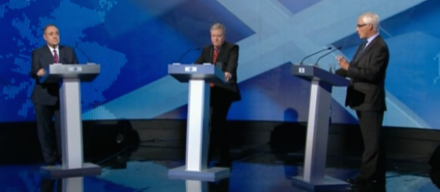
Alex Salmond has a fearsome debating reputation. For many of us south of the border, last night’s television debate wasn’t just our first taste for real of the Scottish referendum campaigns, it was a chance to get a rare glimpse of one of the UK’s most successful recent politicians.
With the Yes camp trailing, with Salmond’s reputation, and with the fact that his whole political career has geared towards this very debate, plenty of us were expecting Scotland’s First Minister to emerge victorious over Better Together Alistair Darling last night.
But he didn’t. He didn’t even come close.
The early exchanges (when we were finally able to see them, STV’s site crashing, having not prepared for the weight of interest) were a little timid, but appeared to reveal one thing: the studio audience were largely behind Salmond.
What really opened up the debate was the cross-examination. Darling, having won a toss of the coin, went first, and jumped straight into the currency question. Westminster politicians all agree that an independent Scotland could not keep the pound, he said, so what currency does Salmond think they will move to? What’s the Plan B?
“We’ll keep the pound,” Salmond said. Nothing less, nothing more. In the space of a couple of minutes, the argument was over, because Salmond didn’t have one. There was no logic, only a mantra: “We’ll keep the pound.” His reasoning was the same as his conclusion: “We’ll keep the pound.”
Darling pushed and pushed (“You could have the Euro? Or the Chinese Yuan?”, as Salmond managed to flail without budging an inch. Here is where the initial leanings of the crowd came into play, as boos started to rain down on Comical Alex.
In response, Salmond’s cross-examination fell short. He attempted to pull apart Darling’s arguments by using previous quotes against, even pulling out a transcript to get it word perfect – a debating technique Cicero would have dismissed as old fashioned. Dutifully, Darling had brought his own transcript of the very quote Salmond suggested was so damning, and provided context. No points scored there.
Salmond moved on, quoting Darling’s “colleagues”: Andy Burnham had suggested an independent Scotland would be more at risk to attacks from outer space. Did Darling agree?
“Well that was a joke,” Darling replied. It was then that the world fell in for Salmond – quotes suddenly appeared woefully trivial compared to the question Darling had asked. Who cares if an English politician made a gag about aliens? People want to know that their savings, their mortgages and their pensions will be safe in an independent Scotland.
With his back against the wall, Salmond finally found something he could get Darling on. David Cameron said an independent Scotland could be “successful”. Does Darling agree? Yes or no?
Darling did agree, but couldn’t answer the question straight. He didn’t want to be seen to agree with Cameron and he didn’t want to say that a Yes vote wouldn’t be the end of the world. If another debate happens (and there’s one scheduled in for the BBC in a couple of weeks), then he needs to find a more comfortable way of saying that it could work, but the UK works better.
But it was too late for Salmond. The debate had been long lost. He’d used the same tactic for his best attack as he had for his earlier trivialities and none of them made up for the answers he’d failed to deliver. When the audience was brought in to make comments, it was the single question that hung over every remark: what’s the currency?




More from LabourList
‘Help shape the next stage of Labour’s national renewal through the 2026 NPF consultation’
‘AI regulation is key to Labour’s climate credibility’
Ben Cooper column: ‘Labour needs to rediscover its own authentic populism’